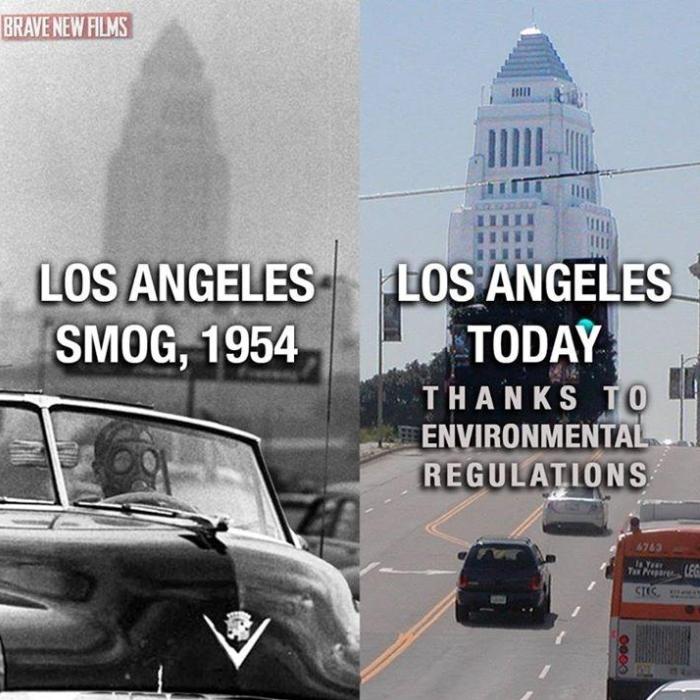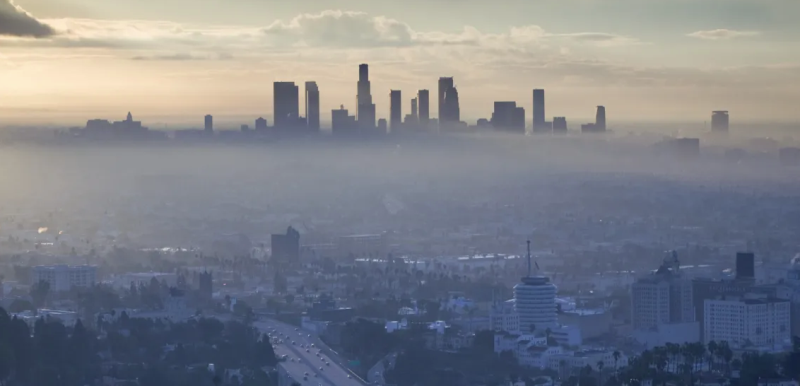File:Smog lung-damage2.jpg: Difference between revisions
Siterunner (talk | contribs) No edit summary |
Siterunner (talk | contribs) No edit summary |
||
| (One intermediate revision by the same user not shown) | |||
| Line 26: | Line 26: | ||
················································································································ | |||
<big> | |||
<big>'''Shocking No One, LA Is Number 1 In Smog Pollution Yet Again'''</big> | |||
April 2022 | April 2022 | ||
| Line 34: | Line 37: | ||
<big> | <big>'''American Lung Association / State of the Air Report'''</big> | ||
* https://www.lung.org/research/sota | * https://www.lung.org/research/sota | ||
<big> | <big>'''Pollution Report Paints Gloomy Picture of Smoggiest U.S. Cities'''</big> | ||
: ''Los Angeles topped the dirty air list for the 14th time in 15 years'' | : ''Los Angeles topped the dirty air list for the 14th time in 15 years'' | ||
| Line 53: | Line 56: | ||
························································································· | |||
* https://www.greenpolicy360.net/w/Category:Air_Pollution | * https://www.greenpolicy360.net/w/Category:Air_Pollution | ||
Latest revision as of 18:49, 22 August 2024
Asthma and Air Pollution
Ground-level ozone is part of “smog” or haze. It is most common in cities where there are more cars and use of fossil fuels. It is also more common in the summer when there is more sunlight, heat, and low winds. Ground-level ozone is created by chemical reactions between emissions of burning fuel emissions and volatile organic compounds (VOC), heat, and sunlight. It is associated with worsening respiratory diseases such as asthma and chronic obstructive pulmonary disease (COPD). Ozone triggers asthma because it is very irritating to the lungs and airways.
Nitrogen dioxide (NO2), Sulfur dioxide (SO2), Carbon monoxide (CO), Methane (CH4)
Other gases can also affect your health and environment.
Nitrogen dioxide (NO2) comes from burning fuels. It also forms from emissions from cars, trucks, other vehicles, and power plants. It is part of smog (haze). Breathing in NO2 can cause someone to develop asthma. It can worsen lung disease, especially asthma.
Sulfur dioxide (SO2) comes from burning fossil fuels, transportation, volcanoes, and industrial processes. It can be found in smog or haze. SO2 can harm plants (including trees). It can harm your lungs and lead to health problems.
Carbon monoxide (CO) forms from incomplete combustion of fuels and wood. It has no smell. It can be very dangerous when it builds up inside buildings, homes, and cars.
Methane (CH4) is another gas that is part of air pollution. It mostly comes from animal agriculture and in subarctic regions where it is released from melting permafrost. Fossil fuels (oil, gas, coal) and waste (food, landfills, wastewater) also add methane to the air. Methane is 30 times more potent at trapping heat than carbon dioxide (CO2) as a major greenhouse gas that is worsening the climate crisis. Methane can turn into ground-level ozone, which is harmful to human health.
Cancer and Oil/Gas/Carbon Emissions
················································································································
Shocking No One, LA Is Number 1 In Smog Pollution Yet Again
April 2022
American Lung Association / State of the Air Report
Pollution Report Paints Gloomy Picture of Smoggiest U.S. Cities
- Los Angeles topped the dirty air list for the 14th time in 15 years
ABC News
April 2014
More than half of Americans breathe in unhealthy air, according to a new American Lung Association’s “State of the Air 2014” report.
The Association found that air pollution throughout the nation has gotten a little worse since last year’s report. In particular, ozone levels rose in the three year period from 2010 to 2012, possibly because of climate change.
“We’re making progress but some of that could be reversed with rising ozone levels,” said Janice Nolen, the Lung Association’s vice president of national policy. “A changing climate is going to make it harder to protect human health.”
·························································································
- https://www.greenpolicy360.net/w/Category:Air_Pollution
- https://greenpolicy360.net/w/Category:Air_Quality
- http://thinbluelayer.com
- https://www.greenpolicy360.net/w/Environmental_Protection_Agency
- https://www.greenpolicy360.net/w/National_Environmental_Policy_Act
- https://www.greenpolicy360.net/w/File:Env_policy_laws_US_%27the_beginning%27_of_env_era.jpg
- https://www.greenpolicy360.net/w/George_E._Brown_Jr
- https://www.greenpolicy360.net/w/Earth_Day_Memories_on_the_50th_Anniversary
- https://www.greenpolicy360.net/w/File:US_Public_Law_95-367.png
- https://www.greenpolicy360.net/w/Category:Climate_Change
- https://www.greenpolicy360.net/w/Category:Climate_Policy
On a good day it can be blue sky...
On a smoggy day it looks like this...
File history
Click on a date/time to view the file as it appeared at that time.
| Date/Time | Thumbnail | Dimensions | User | Comment | |
|---|---|---|---|---|---|
| current | 16:36, 22 August 2024 |  | 460 × 246 (60 KB) | Siterunner (talk | contribs) |
You cannot overwrite this file.
File usage
The following 2 pages use this file:

